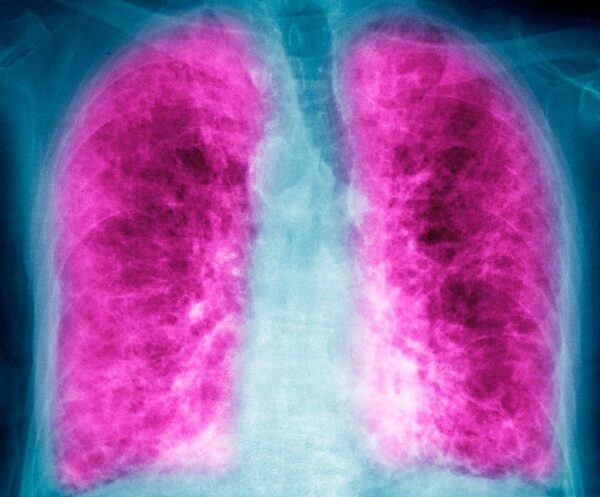
A FibroGen drug envisioned as offering a way to treat a range of diseases driven by scar tissue has failed a pivotal study testing it in a chronic lung disorder, leading the company to stop further clinical development in this indication. The results mark the second Phase 3 failure in the past month for the drug, pamrevlumab, raising questions about its prospects in other diseases.
The preliminary results announced Monday are from a study in idiopathic pulmonary fibrosis (IPF), a chronic condition that causes fibrosis, the formation of scar tissue in the lungs. This disease has few FDA approved therapies and the worsening lung function eventually leads to death, typically from respiratory failure. The Phase 3 test’s main goal was to show a change in forced vital capacity, a measure of how much air can be expelled from the lungs. FibroGen said Monday that its drug, administered by intravenous infusion every three weeks, failed to distance itself from a placebo on this measure after 48 weeks of treatment. The preliminary results also showed the drug failed to meet a secondary goal measuring time to disease progression.

With the Rise of AI, What IP Disputes in Healthcare Are Likely to Emerge?
Munck Wilson Mandala Partner Greg Howison shared his perspective on some of the legal ramifications around AI, IP, connected devices and the data they generate, in response to emailed questions.
No serious safety problems were reported in the Phase 3 study, one of two FibroGen was running in IPF. But based on the failure in the first Phase 3 study, the company said it will stop the second one. FibroGen said results from the first Phase 3 study in IPF will be presented at a future medical meeting.
Pamrevlumab is an antibody designed to bind to and block connective tissue growth factor, a protein associated with the formation of fibrosis. FibroGen hoped this approach could also apply to Duchenne muscular dystrophy. While the inherited muscle-wasting disorder is driven by the lack of a muscle protein called dystrophin, it also leads to fibrosis in skeletal muscle. Earlier this month, FibroGen reported preliminary results from a Phase 3 test of pamrevlumab in Duchenne patients who do not have the ability to walk. The study failed on the main goal assessing upper limb function after treatment for 52 weeks. The drug is also being assessed in a separate Phase 3 test in ambulatory Duchenne patients. FibroGen said preliminary results from this study are expected in the third quarter of this year.
In cancer, FibroGen aims to treat the disease by interfering with a support system of cancer cells. The composition of a tumor includes non-cancer tissue called stroma, which is comprised of connective tissue that supports the cancer cell. In certain cancers, the stroma and tumor cells produce connective tissue growth factor. FibroGen has reached Phase 3 testing of pamrevlumab in combination with chemotherapy as a potential treatment for advanced pancreatic cancer. Preliminary data from this study are expected in the first half of 2024.
Following pamrevlumab’s failure in IPF, William Blair analyst Andy Hsieh has low expectations for the FibroGen drug in both Duchenne and pancreatic cancer. In Duchenne, the trial failure in non-ambulatory patients likely reads through to ambulatory patients, he said in a note sent to investors Monday. In pancreatic cancer, Hsieh said the ongoing Phase 3 study is supported by limited data. An interim look at event-free survival allowed the trial to continue to the overall survival endpoint. However, Hsieh said the “lack of a significant signal during the interim analysis suggests modest benefit.”
FibroGen has one commercialized product, roxadustat. The drug treats anemia from chronic kidney disease and it is sold in China, Japan, and Europe through partnerships with Astellas Pharma and AstraZeneca. In 2021, the FDA rejected FibroGen’s application for roxadustat, asking for another clinical trial. FibroGen and AstraZeneca have been unable to find a path forward for the drug in that indication. As part of the collaboration with AstraZeneca, the drug was also tested as a treatment for anemia caused by myelodysplastic syndromes, a group of blood cancers. In early May, FibroGen reported a Phase 3 test in this indication did not meet its main goal.
FibroGen reported that it finished the first quarter of this year with a $188.5 million cash position, which the company estimated would be enough to finance operations for at least the next 12 months. After the latest clinical trial failure, FibroGen said it is planning “a significant cost reduction effort in the U.S. with the intent to extend our cash runway into 2026.” No further details of the cost-cutting plans were disclosed.
“FibroGen’s focus will be on reporting the additional pamrevlumab studies, advancing our pipeline, and continuing commercialization of roxadustat in China and in countries where approved,” CEO Enrique Conterno said in a prepared statement.
Photo: Cavallini James/BSIP/Education Images/Universal Images Group, via Getty Images














